Types of Lights to Grow Autoflowering Cannabis
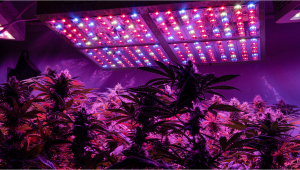
- 1. Do autoflowers need strong lights?
- 2. Best types of lighting used for autoflowering cannabis
- 2. a. Cfl lights
- 2. b. Fluorescent lights
- 2. c. Hid lights
- 2. d. Led lights
- 3. Sunlight
- 4. Essential indoor grow room equipment
- 5. In conclusion
Growing cannabis is genuinely satisfying, but since there are restrictions in many places, you’re forced to go indoors. In these situations, lighting plays a major role. Thus, we present to you the types of lights to grow autoflowering cannabis. If you’re growing autos, you need to focus a lot on the lighting. Compared to photoperiod varieties, autos need your attention when it comes to light.
Why? Because autoflowers have a short life. They grow and produce buds that can be harvested in just under 2-3 months. With such a short span of life, you cannot afford to make the plants weak by providing cheap lighting. Adding to the dilemma of an autoflowering cannabis grower, you have just too many options out there today. CFL, HID or LEDs? While some say that CFLs are just enough for autos, those that use LED will completely disagree. Obviously, LEDs are stronger than CFLs, but what’s really best for autos?
1. Do Autoflowers Need Strong Lights?
Autoflowers will grow nice even with 12/12 lighting, so why do they even need strong lights, you ask? Yes, the question makes sense. But, think about it – if they’re going to get only 12/12 hours of light every day, don’t you think it’s imperative that they get light that’s as good as sunlight? Also, autos that get about 18 hours of light and 6 hours of darkness from the beginning to the end perform better than those with minimal lighting. Point is that autos will grow even in a 12/12 cycle, but if you want stunning yields, you’ll have to provide more light. Plus, strong lights are a must. As long as you’re not trying to reduce costs, using weak lighting doesn’t make sense.
2. Best Types of Lighting Used for Autoflowering Cannabis
CFL Lights
Unless you’re growing in a closet, CFLs should never be your choice. However, we are including it in the list here because it’s one of the options if you choose to grow marijuana stealthily. Additionally, there’s no other lighting that can beat CFLs if you don’t have a lot of space. Also, CFLs are available everywhere. And, they are cheap to beat. You’ll need to use two different types of CFLs for the growing and flowering phase, though. For instance, if the plants are in the vegetative stage, you’ll need daylight CFLs whereas CFLs emitting warm light will be perfect for the flowering phase. One drawback of using CFLs in bigger grow rooms is that you’ll have to use many CFLs to provide enough light to the plants. They aren’t very strong either, especially if you compare them with LEDs and HIDs.
Fluorescent lights
Fluorescent lights – also referred to as T5 lights by some – are great for autoflowering plants. They aren’t very strong, but the plants grow decently as long as you provide many sets of lights. Like CFLs, you will need to purchase more lights.
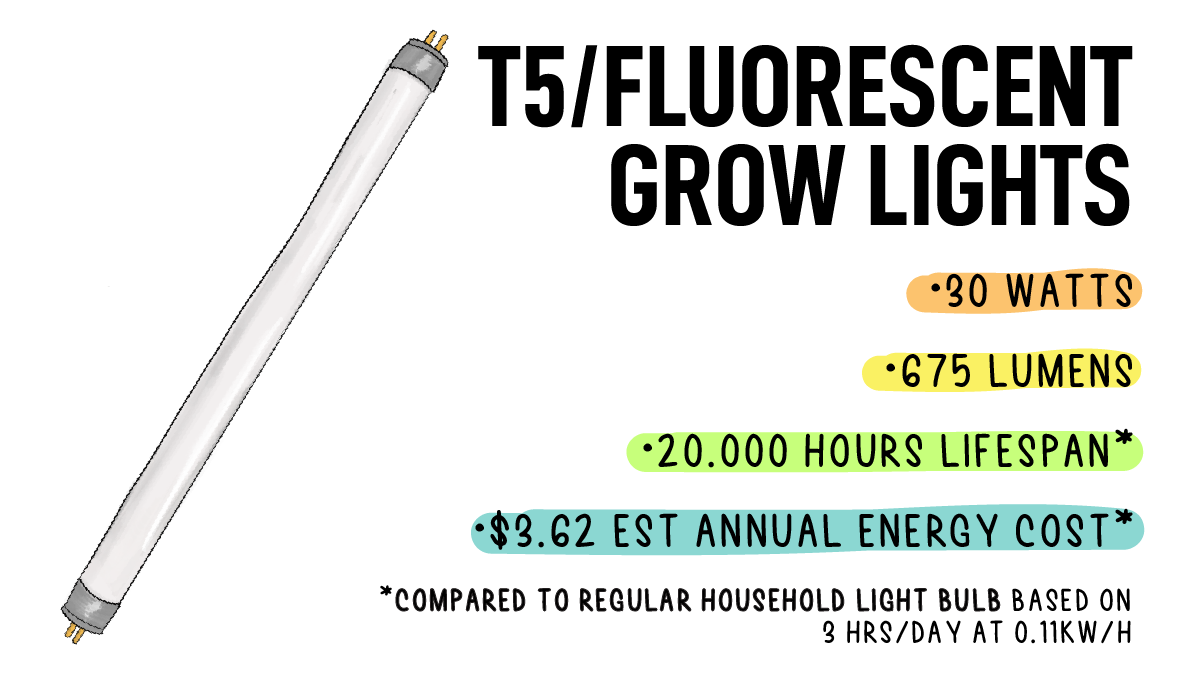
T5 lights work well for plants during the vegetative stage, but they don’t serve the purpose during the flowering phase. For this very reason, most growers prefer other lights.
HID Lights
HID lights are arguably the strongest in the market. They are sturdy, strong, and last a long time. Most HPS lights work very well for at least 20 to 24000 hours. Once the bulb stops working, you need to replace them. You can use Metal Halides during the vegetative phase; however, you’ll have to switch over to HPS lights during the reproductive stage because MH lights don’t work too well when the plants are flowering. You have to understand that you have to switch lights since you need to replicate the seasons. The main reason to not use MH during flowering phase is that they produce a lot of blue light. An abundance of blue light during the vegetative phase is amazing, but it becomes a hindrance during the flowering period. It also produces airy buds instead of yielding resinous, dank buds. What is perfect during the flowering phase are HPS or high-pressure sodium lights.
They produce loads of yellow light that most cannabis plants love especially when they are flowering. One advantage of using HIDs is that they are cheap and available almost everywhere. However, due to the amount of power they consume, you may find the electric bill a little too expensive for your taste. If budget isn’t a concern, using a combination of MH and HPS lights is the best lighting you can provide while growing autoflowering cannabis. A word of caution if you’re using HIDs, though. Since they produce lots of light, they tend to heat up quickly. Thus, you have to pay attention to the ventilation. Purchase high-power fans that prevent the tops from burning. Fans will also reduce the heat and you’ll prevent any chances of a mishap.
LED Lights
In this picture above, 4 plants are growing under an 83W LED light! LEDs or Light Emitting Diodes are the best lights to grow autoflowering cannabis without a doubt. Honestly speaking, LEDs are perfect to grow any kind of marijuana. Although you don’t need to switch light and dark cycles for autoflowers, most LEDs come with an option to do so. This way, you can even save some money by saving power. You can use LEDs to your advantage by providing blue light in the vegetative phase and then switching to red lights during the reproductive stage, or by using the full-spectrum from seed to harvest. Even smaller LEDs are now available with this option. LEDs are a wonderful combination of most types of lights mentioned here. Want to grow in the closet? You can purchase smaller LEDs that fit snugly in the closet. Have a big grow room? Get one of those swanky lights with a range of power from 300 to 2000W. Yes, you can go as far as 2000W! And, talking of power, you will be worried about the electric bill. But, thank goodness for LEDs because they don’t consume a lot of power at all!
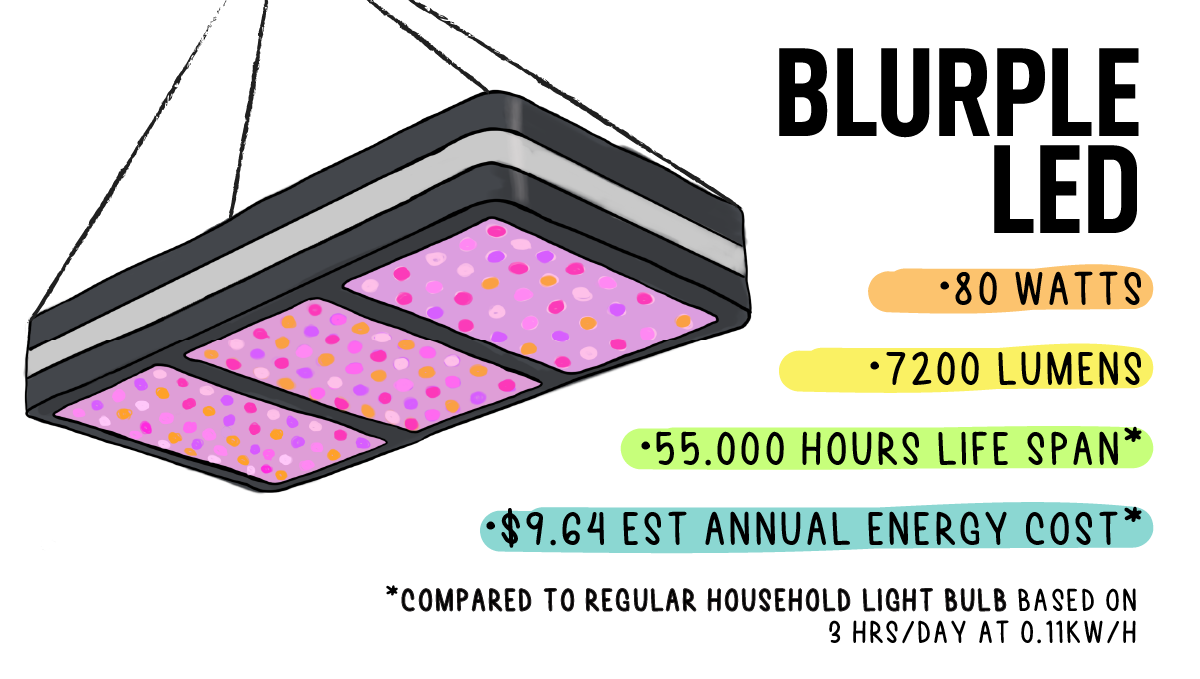
The best part of using LEDs is that they don’t heat up unlike other powerful lighting equipment. They are sturdy and last longer than 100,000 hours! Yes, you read that right! These beautiful babies last so long that you’ll not have to worry about replacing them. This also means that you’d have to replace at least 5 HPS bulbs in the amount of time taken by an LED! Imagine all the money you could save!
Earlier, LED lights were super expensive, but they are cheap now thanks to technology. You can even get LED strips to cover any area that doesn’t get a lot of light. Most LEDs also come with fans attached so heat will not be a problem. To take it up a notch, you can use COB LEDs which are the most powerful of all LED lights. Usually available as single lights or in pairs, COBs emit so much light that it’s difficult to even look at them without safety goggles! Many LED companies also offer safety goggles because of the intensity of light, so you don’t have to worry about purchasing them separately.
3. Sunlight
As you might imagine, there’s no replacement for nature. Cannabis plants have been growing in sunlight for thousands and thousands of years, so we could say that sunlight is the best type of light for cannabis and for growers as it provides full-spectrum light with UVA and UVB rays while being 100% free. So if growers can get free light that’s much, much better than the light fixtures mentioned above, why would they grow indoors? Well, depending on where you live, climate conditions may not be the best for outdoor growing, which forces cultivators to grow indoors after the outdoor season. This takes us to the next question…
Does Cannabis Grow Better in Sunlight?
Sunlight is free, which is an enormous advantage but cannabis plants can grow under any type of light, this means that you can get excellent results with any lighting as long as you’re providing enough light. This longstanding debate will continue forever because each grower has his own style of growing, so it all comes down to personal preference.
If you’re a beginner and want to understand the basics, it’s recommended to take advantage of the sunlight because it’s free and once you get the hang of it, you can go ahead and invest in a good indoor setup. Just keep in mind that you don’t need to follow anyone's recommendation, just experiment and try different products and setups until you find the right one for you.
There we go, everything there is to know about all the various lighting options for indoor cannabis grow rooms, tents, closets, balconies, and even ones to use to add additional light to a greenhouse and other outdoor weed growing situations. But what about all the other equipment needed to grow top-shelf, dank-as-hell cheeba? Let's dive in...
4. Essential Indoor Grow Room Equipment
Ok, so we have all the info we could ever need on the lighting. Let's look at all the other pieces of kit you'll need to set up a successful indoor grow.
A Grow Area
Unless you are growing in a closet or small tent, you'll need some kind of grow room to keep your plants contained and secure. This is the point where many growers mess up and fail to understand the importance of air circulation, humidity control, and temperature control. Without these basic requirements, your plants will not thrive and may even suffer serious harm due to improper airflow and temperature. we almost always suggest just splashing out on a good grow tent, it will make your life that much easier in the long run
Airflow and Air Exchange
Getting ventilation and air exchange right is something you don't want to mess up. while this is an often overlooked area for novice growers, it's just as important as providing the correct light spectrum and penetration. You'll need an extraction fan that takes the hot and moist air out of the grow room and sends it outside. Intake fans are less important for small home setups (although they are needed once you start to plan bigger grow areas), as the exhaust fan will automatically pull fresh air in. Without this setup, your plants will soon suffer due to stagnant air, lack of CO2, and the build-up of toxic substances.
It's also important to set up a few small oscillating fans that point at the canopy, in different directions, to ensure proper canopy airflow. Then there's the carbon filter. These are imperative, not just to scrub the smell of those dank buds from the air leaving the grow room, but to also clean the air inside. Carbon filters contain a specific type of activated carbon that adsorbs odors, molds, bacteria, and more.
Environmental Control and Monitoring
Getting the temperature and humidity levels in the correct zone is essential for cannabis plants to thrive. Too much, or too little of either can be damaging and will stunt growth. The temperature should be kept between 20C-25C and relative humidity within the 40%-60% range if possible. So to ensure these levels are maintained, you'll need a thermometer and hygrometer to monitor the environment. You may need an AC unit, a space heater, a dehumidifier, or a humidifier to help control the climate.
Other Pieces of Equipment
Then there are all the random things that every indoor grower should have at hand:
- An EC or TDS meter to measure the nutrient levels
- A pH meter
- Buckets
- Timers
- Nets and trellis
- A watering can
- Pruning shears
- Trays
- Spray bottle
- Cleaning equipment
5. In Conclusion
In conclusion, after comparing most types of lighting you can use to grow autoflowering cannabis in particular, you can safely say that LEDs are best. Due to the features, power, and lifespan it offers, you can be sure to grow some big buds oozing with a lot of resin.
Having said that, LED light fixtures can be quite expensive for the average home grower, but don’t worry, you can without a doubt get the same quality, or even better as with LED lights as long as you provide your plants the right light spectrum and light intensity at the right time.








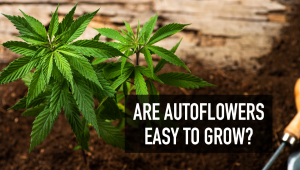


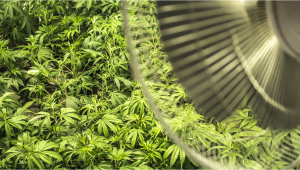
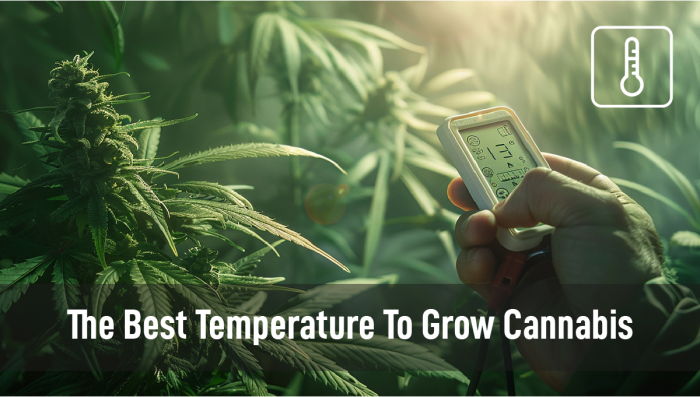

Comments